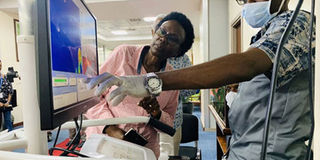Corona: Set testing centres in camps

What you need to know:
- By Thursday, the country had confirmed 53 Covid-19 cases, with fears that the number could rise. As of March 10, more than 100 countries were reporting local transmission of Covid-19.
The Covid-19 has caused a public-health emergency around the world. The outbreak has sparked mixed reactions on the capability of developing countries such as Uganda, that hosts many refugees, to respond to the outbreak. Though poor, Uganda is among the largest refugee-hosting countries in Africa, with more than a million refugees. Many of the refugees are from South Sudan, the Democratic Republic of Congo (DRC), Burundi and Somalia. Kenya, Sudan, DRC and Ethiopia are also among the top refugee hosting countries on the continent.
Refugees in Uganda in particular and Africa in general suffer from high rates of illnesses, particularly infectious diseases and malnutrition, famine, unclean water, poor sanitation and shelter. According to the World Health Organisation, Africa region is witnessing a rapid rise in the number of reported cases of Covid-19, with almost a 25 per cent daily increase. This, coupled with environments in refugee camps that lead to high exposure to infectious diseases such as cholera, Ebola, etc, make the refugees very vulnerable.
The coronavirus pandemic has sparked mixed reactions on the capability of developing countries to respond to the outbreak. The government has taken drastic measures to contain the spread of Covid-19 by closing schools, universities and are enforcing compulsory quarantine, banning of public and private transport and the sale of non-food items in open markets. However, such measures could be very hard to implement in refugee camps. Uganda currently has more than 11 refugee settlement camps hosting more than 1.4 million refugees. These camps are overcrowded with limited access to health care facilities. According to UNHCR, there are not enough intensive care units and ventilation equipment in Uganda’s underfunded refugee settlements.
By Thursday, the country had confirmed 53 Covid-19 cases, with fears that the number could rise. As of March 10, more than 100 countries were reporting local transmission of Covid-19. Of these, 34 countries have refugee populations exceeding 20,000 people, which are currently unaffected by the virus.
In the wake of the Covid-19 pandemic, the UNHCR launched a global appeal for $255m to respond to the coronavirus in refugee camps and other vulnerable areas as part of a wider humanitarian relief plan seeking to raise $2b. However, the question remains on how donor countries will be able to contribute to such funding drives given that they too are struggling to contain the pandemic.
In such cases, the government’s prevention, preparedness and communication strategies in regard to containing Covid-19 pandemic in refugee camps are very important. This is because refugees as internally displaced people often find themselves in places that are overcrowded or where public health and other services are already poorly funded. The government should step up efforts to expand testing services to camps with large refugee populations and setting up screening facilities and isolation beds at every camp. Volunteers and healthcare workers should also be trained early enough in an effort to support the existing services in the camps. These would aid in tracing contacts and isolating people who may have been exposed to the virus.
Anthony Byamukama,
Kampala




